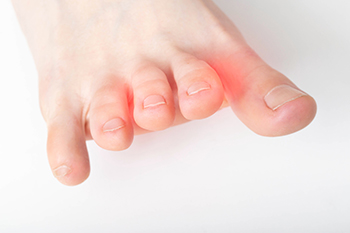
If you walk around feeling like you have a pebble in your shoe under the ball of the foot, you might have Morton’s neuroma. This is a thickening of the tissues next to nerves leading to the toe. Women are much more likely to suffer from this condition than men because they are more apt to wear high heels, which put pressure on the feet. Wearing shoes that are too tight or narrow may also lead to this uncomfortable foot ailment. Beyond feeling like there is a pebble under your foot, one can experience pain, burning, cramping, and/or numbness of the foot. Rest, foot stretching exercises to promote blood circulation, massaging the affected part of the foot, using shoe pads or orthotics to help absorb pressure, and wearing well fitting, flatter, supportive shoes should all help with irritation of a Morton’s neuroma. However, if you are having troubling symptoms for a prolonged time, it is suggested that you contact a podiatrist for proper diagnosis and a treatment plan.
Morton’s neuroma is a very uncomfortable condition to live with. If you think you have Morton’s neuroma, contact one of our podiatrists of Podiatry Care Specialists. Our doctors will attend to all of your foot care needs and answer any of your related questions.
Morton’s Neuroma
Morton's neuroma is a painful foot condition that commonly affects the areas between the second and third or third and fourth toe, although other areas of the foot are also susceptible. Morton’s neuroma is caused by an inflamed nerve in the foot that is being squeezed and aggravated by surrounding bones.
What Increases the Chances of Having Morton’s Neuroma?
- Ill-fitting high heels or shoes that add pressure to the toe or foot
- Jogging, running or any sport that involves constant impact to the foot
- Flat feet, bunions, and any other foot deformities
Morton’s neuroma is a very treatable condition. Orthotics and shoe inserts can often be used to alleviate the pain on the forefront of the feet. In more severe cases, corticosteroids can also be prescribed. In order to figure out the best treatment for your neuroma, it’s recommended to seek the care of a podiatrist who can diagnose your condition and provide different treatment options.
If you have any questions, please feel free to contact our offices located in West Chester, and Broomall, PA . We offer the newest diagnostic and treatment technologies for all your foot care needs.
